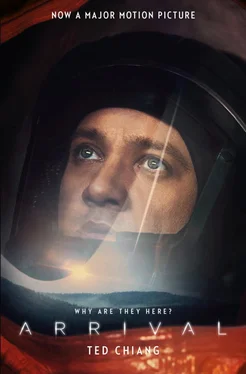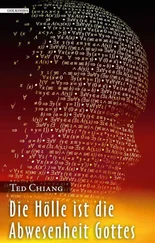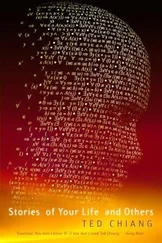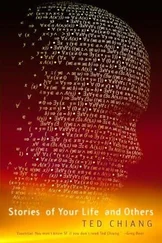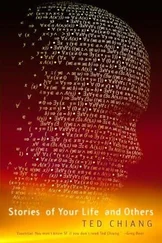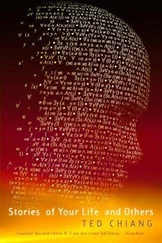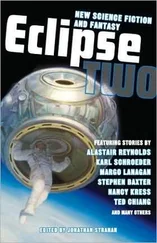Then I rewound the videotape until the time signature matched the one in the transcription. I started playing the tape, and watched the web of semagrams being spun out of inky spider’s silk. I rewound it and played it several times. Finally I froze the video right after the first stroke was completed and before the second one was begun; all that was visible on-screen was a single sinuous line.
Comparing that initial stroke with the completed sentence, I realized that the stroke participated in several different clauses of the message. It began in the semagram for ‘oxygen,’ as the determinant that distinguished it from certain other elements; then it slid down to become the morpheme of comparison in the description of the two moons’ sizes; and lastly it flared out as the arched backbone of the semagram for ‘ocean.’ Yet this stroke was a single continuous line, and it was the first one that Flapper wrote. That meant the heptapod had to know how the entire sentence would be laid out before it could write the very first stroke.
The other strokes in the sentence also traversed several clauses, making them so interconnected that none could be removed without redesigning the entire sentence. The heptapods didn’t write a sentence one semagram at a time; they built it out of strokes irrespective of individual semagrams. I had seen a similarly high degree of integration before in calligraphic designs, particularly those employing the Arabic alphabet. But those designs had required careful planning by expert calligraphers. No one could lay out such an intricate design at the speed needed for holding a conversation. At least, no human could.
There’s a joke that I once heard a comedienne tell. It goes like this: ‘I’m not sure if I’m ready to have children. I asked a friend of mine who has children, “Suppose I do have kids. What if when they grow up, they blame me for everything that’s wrong with their lives?” She laughed and said, “What do you mean, if?”’
That’s my favorite joke.
Gary and I were at a little Chinese restaurant, one of the local places we had taken to patronizing to get away from the encampment. We sat eating the appetizers: potstickers, redolent of pork and sesame oil. My favorite.
I dipped one in soy sauce and vinegar. ‘So how are you doing with your Heptapod B practice?’ I asked.
Gary looked obliquely at the ceiling. I tried to meet his gaze, but he kept shifting it.
‘You’ve given up, haven’t you?’ I said. ‘You’re not even trying anymore.’
He did a wonderful hangdog expression. ‘I’m just no good at languages,’ he confessed. ‘I thought learning Heptapod B might be more like learning mathematics than trying to speak another language, but it’s not. It’s too foreign for me.’
‘It would help you discuss physics with them.’
‘Probably, but since we had our breakthrough, I can get by with just a few phrases.’
I sighed. ‘I suppose that’s fair; I have to admit, I’ve given up on trying to learn the mathematics.’
‘So we’re even?’
‘We’re even.’ I sipped my tea. ‘Though I did want to ask you about Fermat’s principle. Something about it feels odd to me, but I can’t put my finger on it. It just doesn’t sound like a law of physics.’
A twinkle appeared in Gary’s eyes. ‘I’ll bet I know what you’re talking about.’ He snipped a potsticker in half with his chopsticks. ‘You’re used to thinking of refraction in terms of cause and effect: reaching the water’s surface is the cause, and the change in direction is the effect. But Fermat’s principle sounds weird because it describes light’s behavior in goal-oriented terms. It sounds like a commandment to a light beam: “Thou shalt minimize or maximize the time taken to reach thy destination.”’
I considered it. ‘Go on.’
‘It’s an old question in the philosophy of physics. People have been talking about it since Fermat first formulated it in the 1600s; Planck wrote volumes about it. The thing is, while the common formulation of physical laws is causal, a variational principle like Fermat’s is purposive, almost teleological.’
‘Hmm, that’s an interesting way to put it. Let me think about that for a minute.’ I pulled out a felt-tip pen and, on my paper napkin, drew a copy of the diagram that Gary had drawn on my blackboard. ‘Okay,’ I said, thinking aloud, ‘so let’s say the goal of a ray of light is to take the fastest path. How does the light go about doing that?’
‘Well, if I can speak anthropomorphic-projectionally, the light has to examine the possible paths and compute how long each one would take.’ He plucked the last potsticker from the serving dish.
‘And to do that,’ I continued, ‘the ray of light has to know just where its destination is. If the destination were somewhere else, the fastest path would be different.’
Gary nodded again. ‘That’s right; the notion of a “fastest path” is meaningless unless there’s a destination specified. And computing how long a given path takes also requires information about what lies along that path, like where the water’s surface is.’
I kept staring at the diagram on the napkin. ‘And the light ray has to know all that ahead of time, before it starts moving, right?’
‘So to speak,’ said Gary. ‘The light can’t start traveling in any old direction and make course corrections later on, because the path resulting from such behavior wouldn’t be the fastest possible one. The light has to do all its computations at the very beginning.’
I thought to myself, the ray of light has to know where it will ultimately end up before it can choose the direction to begin moving in . I knew what that reminded me of. I looked up at Gary. ‘That’s what was bugging me.’
I remember when you’re fourteen. You’ll come out of your bedroom, a graffiti-covered notebook computer in hand, working on a report for school.
‘Mom, what do you call it when both sides can win?’
I’ll look up from my computer and the paper I’ll be writing. ‘What, you mean a win-win situation?’
‘There’s some technical name for it, some math word. Remember that time Dad was here, and he was talking about the stock market? He used it then.’
‘Hmm, that sounds familiar, but I can’t remember what he called it.’
‘I need to know. I want to use that phrase in my social studies report. I can’t even search for information on it unless I know what it’s called.’
‘I’m sorry, I don’t know it either. Why don’t you call your dad?’
Judging from your expression, that will be more effort than you want to make. At this point, you and your father won’t be getting along well. ‘Can you call Dad and ask him? But don’t tell him it’s for me.’
‘I think you can call him yourself.’
You’ll fume, ‘Jesus, Mom, I can never get help with my homework since you and Dad split up.’
It’s amazing the diverse situations in which you can bring up the divorce. ‘I’ve helped you with your homework.’
‘Like a million years ago, Mom.’
I’ll let that pass. ‘I’d help you with this if I could, but I don’t remember what it’s called.’
You’ll head back to your bedroom in a huff.
I practiced Heptapod B at every opportunity, both with the other linguists and by myself. The novelty of reading a semasiographic language made it compelling in a way that Heptapod A wasn’t, and my improvement in writing it excited me. Over time, the sentences I wrote grew shapelier, more cohesive. I had reached the point where it worked better when I didn’t think about it too much. Instead of carefully trying to design a sentence before writing, I could simply begin putting down strokes immediately; my initial strokes almost always turned out to be compatible with an elegant rendition of what I was trying to say. I was developing a faculty like that of the heptapods.
Читать дальше
